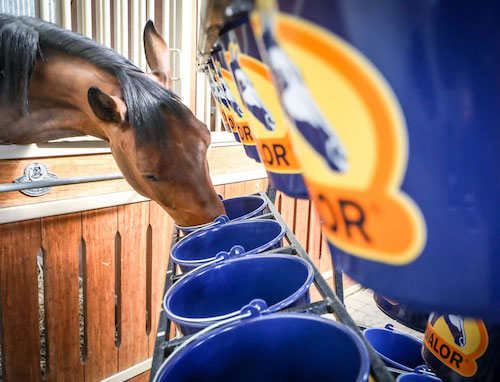
Coping with Behaviour

FULLY FOCUSED OR LOSING THE PLOT?
Horses can suffer from nerves just like humans. Some horses are more susceptible than others due to their genetics and training, among other things. Stress isn’t always a bad thing. Both horses and people need to be a little tense to perform at their best. If they feel under pressure constantly and cannot shake off the tension, however, this is likely to affect their health. Provide sufficient exercise, an enjoyable environment and make deliberate nutritional choices. Your horse’s diet has an enormous impact on its level of anxiety and behaviour.
RECOGNISING THE SIGNS: KNOWING YOUR HORSE’S BEHAVIOUR
These signs occur to different degrees. Obvious, easily recognisable signs include loud snorts, showing the whites of the eyes or nervous pacing. Stereotypical behaviour such as crib-biting, weaving, box-walking and wind-sucking, a faster pulse and breathing rate, tension during training and frequent defecation are more subtle, but also valuable signs. To reduce your horse’s tension, first try adapting its daily environment, diet and management.
understanding is key
Stress triggers the hypothalamus.This is the part of the brain that maintains the body’s internal balance, regulating emotions and needs such as hunger and thirst.Through the spinal cord and nervous system, the hypothalamus controls the adrenal glands, among other things.The adrenal glands (medula and cortex) produce large amounts of adrenaline, noradrenaline and cortisol. Adrenaline helps achieve instant alertness and responsiveness. Cortisol lets your horse stay alert for longer. Both adrenaline and cortisol increase the heart rate, pumping oxygen through the body. Cortisol raises the blood sugar as well. The result is more energy for a longer period.
This means that healthy stress will allow your horse to continue to perform under pressure. After a race (or intensive training) its tension drops, and the adrenaline and cortisol go back to normal levels. When a horse experiences stress for longer periods, the levels of the cortisol stress hormone remain high. As cortisol raises the blood sugar, sustained stress will also result in too much glucose. Persistent stress will definitely impact your horse’s health.
HOW CAN YOU PREVENT YOUR HORSE FROM SUFFERING STRESS-RELATED COMPLAINTS?
Would you like to protect your horse from sustained stress as much as you can? Start with yourself first! Also, provide your horse with sufficient exercise and the right nutrition. The best way to control your horse’s anxiety is to combine the right type of feed in the right quantities with appropriate supplements. This will be different for every horse. That is why our Cavalor products are all provided with clear guidelines.
We’re committed to good health inside and out. Our products – nutrition, supplements and care products – reflect what your horse needs in every sporting achievement, stage of life or special need. Because horses that are happy and healthy are our most valuable asset.

















